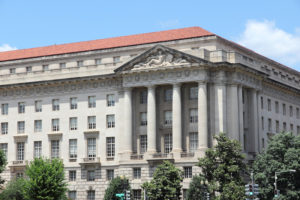
U.S. Senate passes Economic Growth, Regulatory Relief, and Consumer Protection Act, Judge holds EPA rule delay violated Clean Air Act, and more…
IN THE NEWS
- The U.S. Senate voted 67-31 to pass the bipartisan Economic Growth, Regulatory Relief, and Consumer Protection Act. The bill would increase the number of banks that need not comply with certain federal regulations. Senator Heidi Heitkamp (D-N.D.), one of the bill’s drafters, said the bill would help rural community banks and credit unions by eliminating regulations that bog them down. But Senator Sherrod Brown (D-Ohio), recalling the 2008 financial crisis, noted that the “bill rolls back important protections for our economy.” The bill will go to the U.S. House of Representatives next.
- A judge for the U.S. District Court for the Northern District of California ruled that the U.S. Environmental Protection Agency violated its mandate under the Clean Air Act when it missed an October 2017 deadline to implement area air quality designations. An attorney for the Environmental Defense Fund called the decision “a big win for the health of America’s children.”
- The U.S. Department of Agriculture (USDA) announced that it is repealing an Obama-era regulation that established minimum requirements for the treatment of poultry and livestock to be certified as “organic.” USDA concluded that the rule exceeded the agency’s authority under the Organic Foods Production Act and would have a negative effect on the National Organic Program, including raising prices for consumers. The Organic Trade Association, however, said USDA “irresponsibly thwarted a fully vetted regulation overwhelmingly supported by the organic industry and the public.”
- The Federal Election Commission invited comments on its proposals to update two regulations. The Commission explained that it wants to update the regulations “in light of technological advances.” One regulation defines “public communication” as “any…form of general public political advertising” through media like cable and newspaper, and, since 2006, “communications placed for a fee on” websites. The Commission would propose to remove websites from that list and substitute it with “internet-enabled device or application,” like a smartphone or tablet, to cover all the ways by which people communicate today. The other regulation describes when those public communications require disclaimers about who paid for those ads. The Commission would upgrade the disclosure requirements also according to changes in technology.
- The U.S. Securities and Exchange Commission (SEC) charged Jun Ying, the former chief information officer of Equifax, with insider trading. The SEC alleged that Ying traded over $100,000 in Equifax stock between the time he learned about and the company announced a data breach that affected around 148 million customers. Richard Best, Director of the SEC’s Atlanta Regional Office, underscored that “corporate insiders who learn inside information…cannot betray shareholders for their own financial benefit.”
- The U.S. Food and Drug Administration (FDA) asked for information on the addiction effects of nicotine levels in cigarettes in anticipation of potentially creating a rule that would “set the maximum nicotine level for cigarettes.” FDA Commissioner Scott Gottlieb praised the action as “a pivotal step” in reducing cigarette addiction.
- The U.S. Consumer Financial Protection Bureau published a request for public comment and input on its “efficiency and effectiveness of its rulemaking processes” and whether “any changes to its rulemaking processes would be appropriate.” The public comment period will end on June 7, 2018.
- Oregon Governor Kate Brown (D) signed into law a bill that would require prescription drug manufacturers and health insurers to annually report information related to drug prices and costs associated with developing and marketing prescription drugs. Jim Greenwood, president and chief executive officer of the Biotechnology Innovation Organization, disapproved of the bill, saying, “Instead of providing real transparency, state policymakers have adopted a misleading scheme that will fail to provide patients the lower drug costs they were promised.”
- The Center for Biological Diversity (CBD) filed a complaint against the U.S. Department of State for allegedly violating the Freedom of Information Act. CBD argued that the State Department failed to respond to requests for information about the U.S. Climate Action Report that the State Department was required to submit in January to the United Nations Framework Convention on Climate Change.
WHAT WE’RE READING THIS WEEK
- In a forthcoming article for the Columbia Law Review, Daniel Walters of the University of Pennsylvania Law School argued that Auer deference, which holds that courts should defer to an agency’s interpretation of its regulations, has not resulted in agencies creating vague rules to have more flexibility to interpret those rules. Walters concluded that agencies are driven by their internal infrastructures rather than the desire to issue vague rules.
- EPA Administrator Scott Pruitt told Bloomberg that California cannot set vehicle emissions standards for the entire country, mentioning that it would raise federalism problems. But under the Clean Air Act, other states can follow California’s vehicle emissions standards. On the federal level, EPA has until April 1, 2018, to decide whether to alter its current standards for vehicle emissions for the years 2022-2025—standards that the California Air Resources Board (CARB) helped create and that former EPA Administrator Gina McCarthy wanted to keep. According to CARB, California is looking beyond 2025 for its own vehicles standards, but Pruitt refused to look further than 2025.
- In a forthcoming article in the Southern California Law Review, Abby K. Wood, an associate professor at the University of Southern California Gould School of Law, Ann Ravel, a professor at the University of California, Berkeley School of Law, and Irina Dykhne, a student at the University of Southern California Gould School of Law, identified a “lack of transparency for online political advertising” and the “disinformation” with which Americans are “attacked.” In response, Wood, Ravel, and Dykhne proposed several ways to make political advertisements more transparent, including a requirement that “platforms store and make available ads that run on their platforms, as well as the audience at whom the ad was targeted.”



